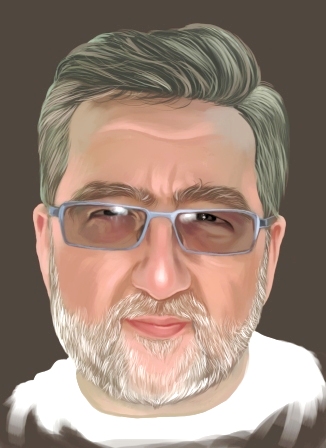 |

Although I love to write about the west, I was actually born in the east -- East London, that is -- in 1958. For as long as I can remember, I always wanted to be a writer, but it was my Dad, Henry Whitehead, who really fostered my interest in the west. As a security man employed by a large chemical company, he often found himself working the nightshift by himself, and to pass the long, lonely hours he would hand-copy pictures from old Buffalo Bill Annuals and then fetch them home for me to colour in.
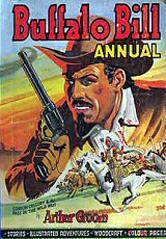 |
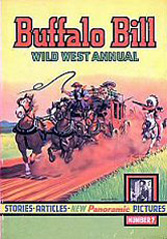 |
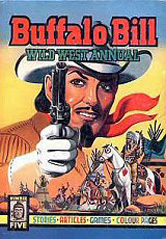 |
During the day, Dad also made up western stories and dictated them into our old reel-to-reel tape recorder, so that I could listen to them when I got home from school. He even added sound effects as he went along, wiggling his fingers in a bowl of water to give the impression of outlaws fording a shallow stream, or bursting balloons to simulate gunfire. So it's really no wonder that I eventually developed such an interest in the west.
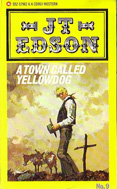 |
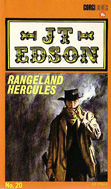 |
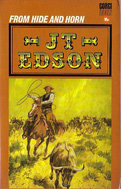 |
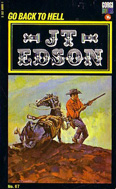 |
As I grew older, I started reading just about every western I could lay my hands on. I began with J T Edson's Floating Outfit novels and eventually moved on to the Larry and Stretch westerns of Marshall Grover (a.k.a. Leonard F Meares). Along the way, I also started writing westerns of my own, the adventures of Clint Jones, Railroad Detective, being among the earliest.
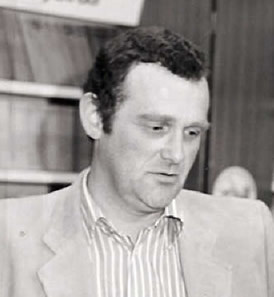
Mike Linaker
By the early 1970s I was reading the Edge novels of George G Gilman, otherwise known as the near-legendary Terry Harknett, and in 1976 I met Terry in person, and set up The George G Gilman Appreciation Society. During this period I got to correspond with many of the big names in the States, including Louis L'Amour, Will Henry, Wayne D Overholser and Ray Hogan, and was also fortunate enough to meet several British western writers, including Peter Watts (a true gentleman who wrote as Matt Chisholm, Cy James and Luke Jones) and Mike Linaker. Mike and I hit it off from the moment Peter Watts first put us in touch with each other, and this tireless, good-humoured and always-exceptional writer remains a valued friend to this very day.
My childhood friend, Mike Stotter (who went on to write a passel of Black Horse Westerns himself, under his own name and the pseudonym Jim A Nelson), took over the running of the Society in 1978, and the club magazine, Steele Edge, became known as The Westerner.
When Angus Wells (better known to western fans as James A Muir, Charles R Pike, William S Brady and others) suggested that Mike and I try to interest a publisher in starting up a western magazine, we approached IPC Magazines, who liked our proposal and immediately set about producing the impressive but ultimately ill-fated Western Magazine. Mike and I were hired as consultants, and we also contributed factual material to each issue.
Western Magazine was launched amid much fanfare in November 1979, and at the launch party, Mike Linaker introduced me to another great western writer, the enormously talented B J Holmes.
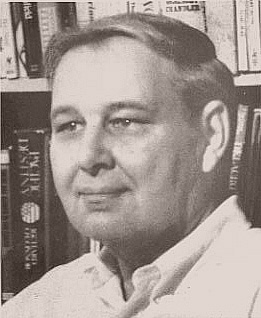
Benjamin Haas (John Benteen)
Although Western Magazine only ran for four issues, it was another exciting time for me, not least because it was about now that I discovered the Fargo and Sundance westerns of John Benteen, and saw for the first time just how a good, fast-moving western yarn should really be told. Sadly, Benteen (in reality the novelist Benjamin Haas) passed away before I could let him know just how much I enjoyed his work, but another of my idols, Australia's Marshall Grover, was still very much alive, and we began a long and wonderful correspondence which lasted right up to his death in 1993.
For a while after Western Magazine folded, I continued to try and break into print, but without noticeable success. Eventually, Peter Watts asked me to pick what I considered to be my best western, and let him take a look at it. He warned me that he would treat the manuscript as ruthlessly as he would one of his own, so I should prepare myself for the worst. With some trepidation, then, I gave him a book entitled Shimmering Silver, the second in a series I'd written about a one-eyed Pinkerton operative called Logan Tyree.
Peter returned the manuscript some weeks later, and taken together, the notes with which it was covered (all written in Peter's own immaculate hand), told me exactly where I was going wrong. I've never forgotten the lessons he taught me, or indeed his kindness in so doing, and I still apply his rules and guidelines, even today.
By that time, however, I had other things to occupy me. I had met a girl called Janet and we were married in 1981. I also changed jobs and went to work for the BBC. For a while after that I was just too busy to write. But one day I injured my back doing some work around the house and was forced to take a period of sick-leave. Bored with being stuck at home all by myself, I decided to take another look at Shimmering Silver, and re-write it according to Peter's suggestions. After replacing the foul-tempered, cigar-chomping Logan Tyree with the more likeable Carter O'Brien, I sent the product of my labours - now entitled The Silver Trail - off to Robert Hale Limited, and on 11th December 1984 it was accepted for publication.
I've been writing westerns (and thrillers, and romances, and horrors) ever since.

Benjamin Haas (John Benteen)
Although Western Magazine only ran for four issues, it was another exciting time for me, not least because it was about now that I discovered the Fargo and Sundance westerns of John Benteen, and saw for the first time just how a good, fast-moving western yarn should really be told. Sadly, Benteen (in reality the novelist Benjamin Haas) passed away before I could let him know just how much I enjoyed his work, but another of my idols, Australia's Marshall Grover, was still very much alive, and we began a long and wonderful correspondence which lasted right up to his death in 1993.
For a while after Western Magazine folded, I continued to try and break into print, but without noticeable success. Eventually, Peter Watts asked me to pick what I considered to be my best western, and let him take a look at it. He warned me that he would treat the manuscript as ruthlessly as he would one of his own, so I should prepare myself for the worst. With some trepidation, then, I gave him a book entitled Shimmering Silver, the second in a series I'd written about a one-eyed Pinkerton operative called Logan Tyree.
Peter returned the manuscript some weeks later, and taken together, the notes with which it was covered (all written in Peter's own immaculate hand), told me exactly where I was going wrong. I've never forgotten the lessons he taught me, or indeed his kindness in so doing, and I still apply his rules and guidelines, even today.
By that time, however, I had other things to occupy me. I had met a girl called Janet and we were married in 1981. I also changed jobs and went to work for the BBC. For a while after that I was just too busy to write. But one day I injured my back doing some work around the house and was forced to take a period of sick-leave. Bored with being stuck at home all by myself, I decided to take another look at Shimmering Silver, and re-write it according to Peter's suggestions. After replacing the foul-tempered, cigar-chomping Logan Tyree with the more likeable Carter O'Brien, I sent the product of my labours - now entitled The Silver Trail - off to Robert Hale Limited, and on 11th December 1984 it was accepted for publication.